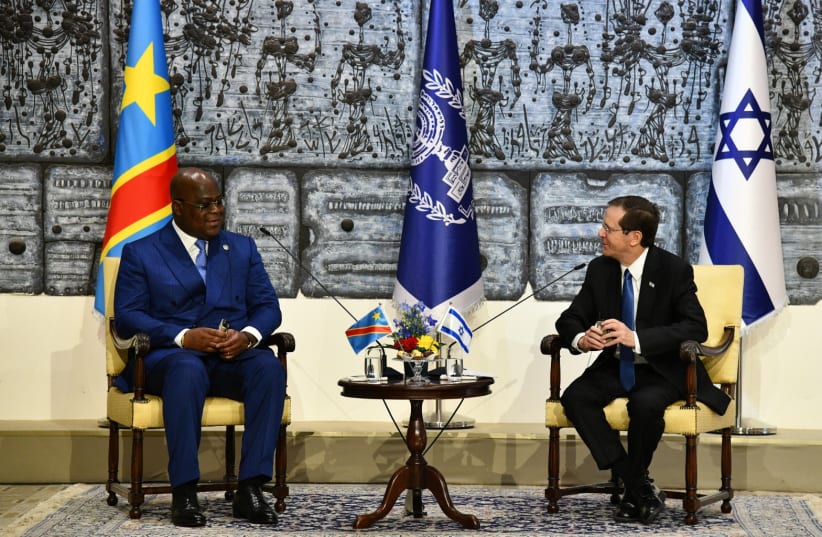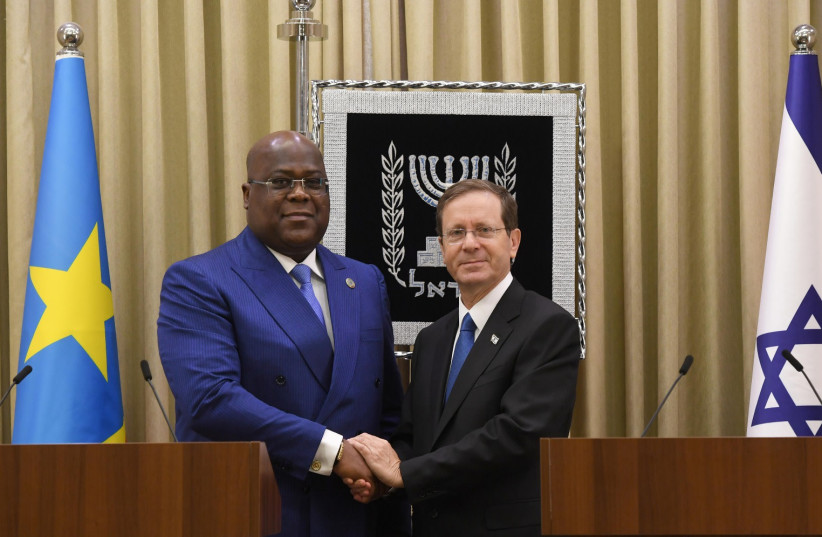The positive vibes between President Isaac Herzog and Felix Tshisekedi, president of the Democratic Republic of Congo (DRC), were unmistakable as Herzog welcomed his guest and told him that there was something symbolic in the fact that the visit by his late father Chaim Herzog to Tshisekedi’s country in 1984, had been the first by a president of Israel, and that Tshisekedi’s should be the first state visit during the younger Herzog’s presidency.
Tshisekedi’s visit is the first by a president of his country since 1985. In 2019, he became his country’s first democratically elected president. Formerly known as Zaire, the DRC established relations with Israel in 1960, and was among the first African countries to do so. In 1973, relations were severed when the DRC joined other African countries to sever relations with Israel after the Yom Kippur War, but they were resumed ten years later. The DRC was the first of the African states to renew ties with Israel, and today votes consistently in Israel’s favor in international forums, particularly the United Nations.
In March 2020, in the course of a visit to the US, Tshisekedi in an address to the America Israel Public Affairs Committee (AIPAC), said that he wanted to build strong ties with Israel, including the appointment of an ambassador, and the setting up of a trade office in Jerusalem. Although the DRC has an embassy in Tel Aviv, for some twenty years it has been headed by a charge d’affaires and not by an ambassador.
Commenting on these two issues, Herzog said that he was very pleased by both prospective developments and would do his utmost to help bring them to realization. He considered Tshisekedi’s visit as a springboard for strengthening ties in all fields.
In July 2020, Benjamin Netanyahu who in his final years as prime minister sought to develop closer relations with Africa sent a letter to Tshisekedi congratulating him on the 60th anniversary of the DRC’s independence from Belgium and invited him to pay a state visit to Israel.
Tshisekedi, who is a devout Christian, said that it was a powerful moment for him to be in the Holy Land and visit holy sites.
Herzog responded that he was welcome not only in Israel but in the city in which the Bible came to life.
Tshisekedi said that when Christians from his country come to Israel, they believe themselves to be in a land that has God’s blessings, just as his own country which has so many natural resources has been blessed by God.
“The DRC is a solution country that will enable us to find solutions for the earth and enable us to fight climate change, and bring our countries closer together,” he said.
He congratulated Israel on expanding its diplomatic relations within the region and said that everyone wants peace.
He also lauded Israel for its many impressive achievements which greatly interest the DRC. He emphasized security and the ability to fight terrorism. Citing his country’s experience with Islamist terrorism, Tshisekedi told Herzog: “You have much experience in fighting terrorism. We want to learn from it.”
During her 10 years as foreign minister, beginning in 1956, Golda Meir took an intense interest in Africa. In 1958 on her first tour of the African continent, Golda visited Liberia and Ghana. She had wanted to visit Zambia when it was still Rhodesia, but was accompanied by an indigenous African, whom the Rhodesian border guards refused to admit. Shocked by such blatant racism, Golda decided that if he couldn’t enter, she wouldn’t enter. In 1962, Israel at the United Nations voted against South Africa’s apartheid policy.
In her visits throughout Africa, Golda saw the untapped potential of people whose ancestors had been taken into slavery, and of resident populations who were treated like outcasts in their own country. To her this was iniquitous, and she was determined to help native Africans to gain personal freedom and independence for their countries.
Israeli experts in agriculture, water management, regional planning, public health, community work, intelligence gathering and police were dispatched to 33 African countries to help the citizens of those states to find their place in a world.
This was a major part of the beginning of MASHAV, Israel’s Agency for International Development Cooperation. Students from Africa and other parts of the developing world came to Israel for more intensive courses, as did many of their leaders who wanted to see for themselves what it was that Israel was offering to share.
Of the 54 internationally recognized African countries, Israel has relations with 46, albeit not full diplomatic relations with all.
Israel used to have observer status with the long-defunct Organization of African Unity, but when it disbanded in 2002 and was replaced by the African Union Israel lost its observer status. Tshisekedi currently serves as president of the AU, a factor that may have influenced a change in attitude towards Israel.
Herzog noted this, praised him for his leadership and thanked him for his support and friendship.
A series of presidents from Ezer Weizman onwards kept raising the issue of Israel gaining observer status with the AU, whenever receiving credentials from new African ambassadors or welcoming African presidents, prime ministers and foreign ministers, but until July of this year, their efforts, and those of the Foreign Ministry yielded no results.
In July, Israel finally attained observer status, so this is a subject that Herzog will not have to tackle.
In his talks with the Israeli leadership, Tshisekedi will focus on security matters, investment and trade, health, communications and agriculture
Included in his delegation are Defense Minister Gilbert Kabanda, Communications and Media Minister Patrick Mayaya, the President’s special envoy to Israel and North America Prof. Serge Tishibanga and the president’s special investments adviser Juan Claude Kabongo.
Before moving on to his next appointment, Tshisekedi assured Herzog that Israel can rely on the continued friendship and support of the DRC.
Deputy Foreign Minister Idan Roll met with Tshisekedi and a delegation of Congolese ministers.
Roll thanked Tshisekedi for actively advocating for Israel to be allowed to join the African Union as an observer, which it did earlier this year.
Tshisekedi briefly lived on Kibbutz Lahav in the Negev as a participant in a program run by MASHAV, Israel's development agency.
Lahav Harkov contributed to this report.

